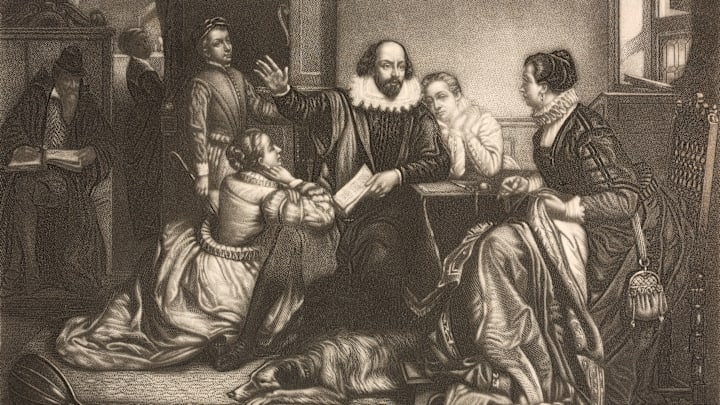In 1757, nearly 150 years after William Shakespeare’s death, a pamphlet was found in the rafters of his childhood home. Handwritten and signed by a ‘J. Shakespeare,’ the document was a passionate Catholic profession of faith. It was a promise to die a good Catholic death, understandably hidden in the rafters during a time when the Protestant Church of England was essentially at war with Catholicism. Discovery could’ve meant torture, or even death.
For years, scholars have considered this pamphlet to be the work of John Shakespeare, William’s father, and used it as evidence that the Shakespeare we all know and love was likely raised in a secretly, and perhaps fervently, Catholic household.
But new analysis of the booklet calls all of that into question. Archival research examining a 1790 copy of the document—as the original was, unfortunately, lost—in addition to other texts from Shakespeare’s time shows that it probably wasn’t written by John Shakespeare, as had always been assumed. Rather, it was the work of William’s younger sister, Joan.
“The Last Will and Testament of the Soul”
Researcher and University of Bristol professor Matthew Steggle pieced together timelines using numerous internet archives to prove that the document must be hers. The writing, it turns out, is actually an incomplete translation of “The Last Will and Testament of the Soul,” an Italian text Steggle deduced originated several years after John’s death in 1601. Meanwhile, Joan was the only other J. Shakespeare living during this period. As a simple matter of dates, the pamphlet must have been hers—a shocking revelation that makes it her only surviving piece of writing.
Steggle’s discovery sets the record straight on an important document in Shakespeare family history. It seems we know less about William Shakespeare’s religious life than ever, given that Joan’s ideologies doesn’t necessarily reflect the attitudes of their childhood home. But beyond that, this revelation gives us crucial insight into the mystery of Shakespeare’s sister.
Who Was Joan Shakespeare Hart?
Not much is known about Joan Shakespeare Hart. Born in 1569, five years after the famous bard, she was the only one of William’s seven siblings to survive him. We know that Joan married a hatter, William Hart, had four children, and lived in a cottage on the Shakespeare estate. Her legacy has endured, albeit differently than her brother’s; her descendants are now his most direct living relatives. But we know little about Joan the person and what she was like. The “Spiritual Testament” gives Joan a voice of her own for the first time.

“I, [Joan] Shakespeare, do protest that I will willingly accept of death in whatsoever manner it may befall me, conforming my will unto the will of God,” she writes. “Accepting of the same in satisfaction for my sins and giving thanks unto his divine majesty for the life he hath bestowed upon me.”
She goes on to claim Saint Winifred as a patron saint whom she hopes will comfort her in her last hours, another key indicator that Joan was likely the writer. Saint Winifred’s life story centered around staving off unwanted suitors, making her a particular favorite among women.
“Shakespeare’s Sister”
Steggle himself feels that Joan Shakespeare Hart’s symbolic meaning as William Shakespeare’s sister makes his discovery all the more important:
“There are only seven surviving documents from Joan’s lifetime that even mention her by name. Virginia Woolf wrote a famous essay, “Shakespeare’s Sister,” about how a figure like her could never hope to be a writer or have her writing preserved, so she has become something of a symbol for all the lost voices of early modern women. There are hundreds of thousands of words surviving from her brother, and until now none at all, of any description, from her.”
Women like Joan are largely lost to history, with records proving they existed at best. But Steggle’s findings have turned the tides in this particular case: Joan’s risky dedication to her faith survives hundreds of years later alongside her brother’s plays.
